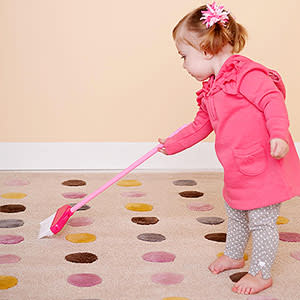The Chore Challenge: Teaching Kids Responsibility

Discover the secret to getting your kid to set the table or tidy her room without being constantly on her case about it.
By Beth Howard
My daughter, Zoe, was 5 when I decided to give her a couple of chores: making her bed every morning and putting some of her clean clothes in drawers on laundry day. Let's just say she blew off these tasks for months. I was beyond frustrated that my sweet kid, who eagerly pitched in at school during cleanup time, couldn't care less about lending a hand at home.
Sound familiar? While chores are typically greeted with enthusiasm in the preschool years ("Look, I'm helping Mommy!"), by the time a child is 5 or 6 -- and genuinely ready for more responsibility -- her natural excitement wanes, says parenting expert Deborah Gilboa, M.D., the founder of AskDoctorG.com. Don't let your chore-dodger off the hook. To spur her on to action, enlist the help of these motivational tricks from the experts.
Pull Out the Big-Kid Card
If you've never specifically given chores to your kid before, he's going to wonder: Why is Mom making me empty the dishwasher or set the table now? So appeal to his desire to be more grown-up. "It can be as simple as saying, 'Now that you're 5, you're stronger, taller, and more careful. I bet you could put away the washed dinner plates,'" suggests Meg Akabas, founder of Parenting Solutions, a consulting firm.
Pitch in Together
Sure, you're not always going to want to do your chores at the same time as your child does hers. But saying something like, "Help me straighten up the house. I'll do my bedroom, and you do yours" will help get a reluctant kid started. 'Young children seem to respond better when household tasks are presented as a shared family responsibility," says Akabas. "Of course, you do a lot of housework, but your child is oblivious to much of it."
Think Like Mary Poppins
That iconic nanny knew that chores don't have to be boring. "By incorporating some fun into tasks, you can improve your kid's attitude about helping with housework," says Lea Schneider, author of Growing Up Organized: A Mom-to-Mom Guide. Put on some music and encourage him to sing or dance while he's cleaning up. (That's why that cleanup song in preschool is so effective.) Or create contests to keep him interested -- and help messes evaporate -- such as "Let's see how many toys we can put away before this song finishes playing" or "I wonder if you could tear all this lettuce into little pieces for a salad by the time I'm done slicing the veggies."
Start a Reward System
I finally got Zoe in a good place with her chores by offering to do something special with her when the job was done. For once-a-week family cleanups, I'd say something like, "If you put all your Groovy Girls into a bin, then you, Dad, and I can go for a bike ride on the greenway." To keep up with her two everyday responsibilities -- making her bed and setting the table -- I customized an online chore chart that allows her to check off her work daily. (You can get one at parents.com/chore-chart.) At the end of a productive week, she earns an extra storytime or we all watch a movie of her choice. "Letting your child know that you'll have time for a fun activity if she completes her chores quickly is much more effective than offering an allowance for chores," says Akabas. "If you pay your child, it becomes difficult to persuade her to help with anything without giving her money."
Related:
This article first appeared in Parents magazine.
